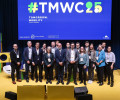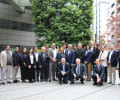FIA TAKES PART IN WORLD BANK MEETINGS IN WASHINGTON DC
Last week, FIA representatives participated in a series of World Bank meetings within the framework of Transforming Transportation 2019, a conference organised in Washington DC by the World Bank and EMBARQ – the sustainable mobility initiative of WRI Ross Center for Sustainable Cities.

On 16 January, the Consortium Meeting of Sustainable Mobility for All (SuM4All) gathered a diverse and influential group of transport stakeholders, with the goal of implementing the UN Sustainable Development Goals and offering a safe and affordable mobility to all, by working on infrastructure, vehicles, and consumers’ preferences.
To go about this objective, SuM4All decided to break the work down into four components: Access, Efficiency, Safety, and Green Mobility. Over the course of 2018, thematic papers were produced by SuM4All members and collated in the draft Global Roadmap of Actions (GRA). The GRA is designed as a tool to identify the synergies and trade-offs between the proposed measures, depending partially on the development level of countries, and to come up with a workable policy framework and related implementation plan.
The meeting summed up the achievements to date: 189 proposed policy measures, distributed in four categories, namely Institutions, Infrastructure & Technology, Incentives & Pricing, and Communications. Furthermore, all countries were catalogued in four groups according to their level of economic development, and between 21 and 31 priority measures attached to each group.
The draft GRA is open for comments until the end of February, after which it will be finalised and disseminated broadly among countries and all development stakeholders.
On 17-18 January, FIA representatives participated in Transforming Transportation 2019, on the theme “Will New Mobility Deliver Sustainable Transport for All?”
The conference focused on how new technologies, data platforms and business models are integrating with current transport modes to solve old problems, from efficiency and equity to safety, and how new mobility can help address climate change.
The panel discussions highlighted the impact of the introduction of new types of vehicles, such as autonomous cars or electric scooters, on the global mobility landscape. Potential enhanced accessibility was weighted against the risks of increased congestion: average car occupation in the US has already come down in 40 years from 1.9 person per car on average to 1.4. Simultaneously, bike sharing has grown by 33% between 2016 and 2017 worldwide, and car sharing doubles yearly in China.
The consequence for safety was specifically discussed, with the need to adjust infrastructure provision to the characteristics of new micro-mobility modes and to keep protecting all vulnerable users, in particular pedestrians. In New York City, for instance, the speed limit has been brought down to 25 mph citywide, while in Spain, the default speed in cities has been set by law to 30 kph, and can be limited to 20 kph when needed.


 Facebook
Facebook Twitter
Twitter






